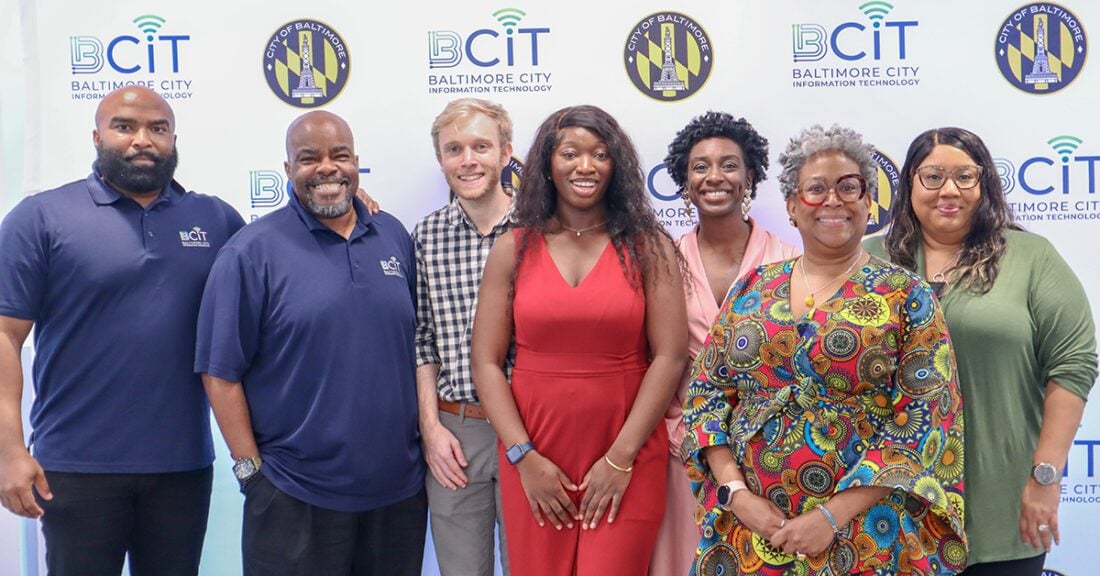Baltimore’s Digital Equity Fund Is Bringing City Residents Online

In 2023, the Annie E. Casey Foundation partnered with several organizations to support Baltimore’s Digital Equity Fund. Led by the Office of Broadband and Digital Equity (BDE) in partnership with the Baltimore Civic Fund, the Digital Equity Fund provides financial support to Baltimore-based organizations as they help residents access the internet and gain digital literacy.
“The Digital Equity Fund is a first-of-its-kind partnership between the City of Baltimore and local non-profits that’s working to ensure that everyone in our city has access to, understands and can effectively use digital technology,” said Sara Cooper, a senior associate with the Casey Foundation. “The internet is an essential public utility and the programs supported by the fund are helping people get and stay connected, find jobs and improve their lives.”
What Is Digital Equity?
Digital equity is the idea that every person should have access to technology and the skills to use it. In 2020, the Abell Foundation found that only half of Black households in Baltimore had access to broadband internet. Among Latino households, less than half of all families had broadband internet access or owned a computer. And according to Maryland’s 2023 Statewide Broadband Access and Equity phone survey, 38% of low-income households in Baltimore lacked access to a computer or could only access the internet through a smartphone.
Over the last year, the Digital Equity Fund’s support has enabled non-profit organizations to:
- increase neighborhood connectivity;
- help residents become more comfortable with devices and internet use;
- connect youth and young adults to digital education;
- integrate proven workforce development strategies with digital education;
- support digital literacy within after-school or recreation center programs;
- provide in-need residents working computers or tablets; and
- introduce new technology to target populations, such as young people, low-income households and older adults.
The Digital Equity Fund’s first cycle of grantees included Code in the Schools, Wide Angle Youth Media, Village Learning Place, the Latino Economic Development Center, MedStar Union Memorial Hospital, Asylee Women Enterprise and Associated Black Charities.
“Closing the digital divide requires an understanding that community-led solutions are key,” said Amalia Deloney, a Casey Foundation-funded consultant who worked one-on-one with each grantee to identify common themes, needs and gaps within digital equity. “Baltimore residents know what is needed, what will work and how to create lasting change. The Digital Equity Fund succeeds because it empowers these communities to lead, ensuring that every solution is rooted in their lived experiences and unique strengths.”
Code in the Schools
Digital Equity Fund grantee Code in the Schools is a nonprofit that connects Baltimore City youth to quality computer science education as well as pathways from school to jobs and higher education. In addition to partnering with schools and local educational organizations, it also offers free computer science education programs and events for middle and high school students.
“Being part of the initial cohort of the Digital Equity Fund transformed how we look at our work,” said Stephanie Alphee, co-executive director of Code in the Schools. “For over a decade, Code in the Schools has been a leader in advocating for computer science education in our schools. The initial Digital Equity Fund [grant] allowed us to pilot this work in Greenmount West, and we are grateful for the opportunity to continue this work preparing young adults for industry-recognized credentials in year two.”
What’s Next?
Recently, the Digital Equity Fund selected 10 new and returning grantees for its second round of grant awards. It awarded organizations across three focus areas:
- Digital literacy education training grants will support literacy education for older adults and the wider community, with the goal of creating tech hubs at recreation centers in underserved areas.
- Advanced digital education and IT fundamentals programming grants will support initiatives providing fundamental skills training and certification to Baltimore City residents interested in a career in IT.
- Digital creatives and virtual makerspaces programming grants will support initiatives providing education and programming for digital creatives and virtual makerspaces at local recreation centers throughout Baltimore City.
“By partnering with innovative grantees, we’re not only bridging the digital divide but also helping our communities to thrive in an increasingly connected world,” said BDE Director Kenya Asli. “The Digital Equity Fund is a testament to Baltimore’s commitment to ensuring every resident has access to the tools and opportunities of the digital age. Together, we are creating pathways [to] equitable access, digital literacy and economic opportunity.”
Learn how Baltimore is helping bridge the digital access divide





